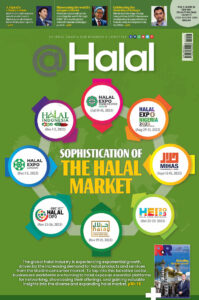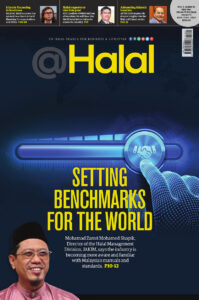The duality of Ramadhan buffets
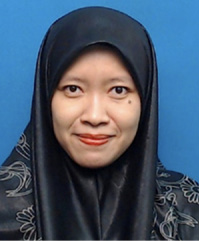

By Dr. Anis Najiha Ahmad and Dr.Nurrulhidayah Ahmad Fadzillah
Ramadhan, the holiest month in the Islamic calendar, is a period of profound spiritual reflection for Muslims worldwide.
In Malaysia, Ramadhan holds particular significance and is characterised by vibrant cultural traditions and culinary delights. Among these traditions, the Ramadhan buffet, offered by hotels and restaurants across the country, has become emblematic.
These buffets cater to the physical needs of fasting individuals and serve as a platform for people of all faiths, including office workers, to come together and share blessings.
Friends, family and community members from different faiths also frequently participate in these gatherings, fostering intercultural understanding and unity among diverse communities.
ALLURE OF RAMADHAN DINING EXPERIENCE
Ramadhan buffets in Malaysian hotels offer more than just food; they create a unique atmosphere with festive decorations, including vibrant lights and traditional displays.
As the call to prayer signals the end of the fast, guests gather at communal tables to enjoy the iftar, the meal Muslims share to break their fast after sunset. Guests are welcomed with dates and refreshing beverages, symbolising the breaking of the fast.
Live cooking stations and interactive counters add excitement, allowing guests to witness their favourite dishes being prepared. From classic Malay dishes like grilled satay and rendang to Middle Eastern delights such as kebabs and baklava, and from Indian curries to Western pasta and salads, Ramadhan buffets offer diverse options.
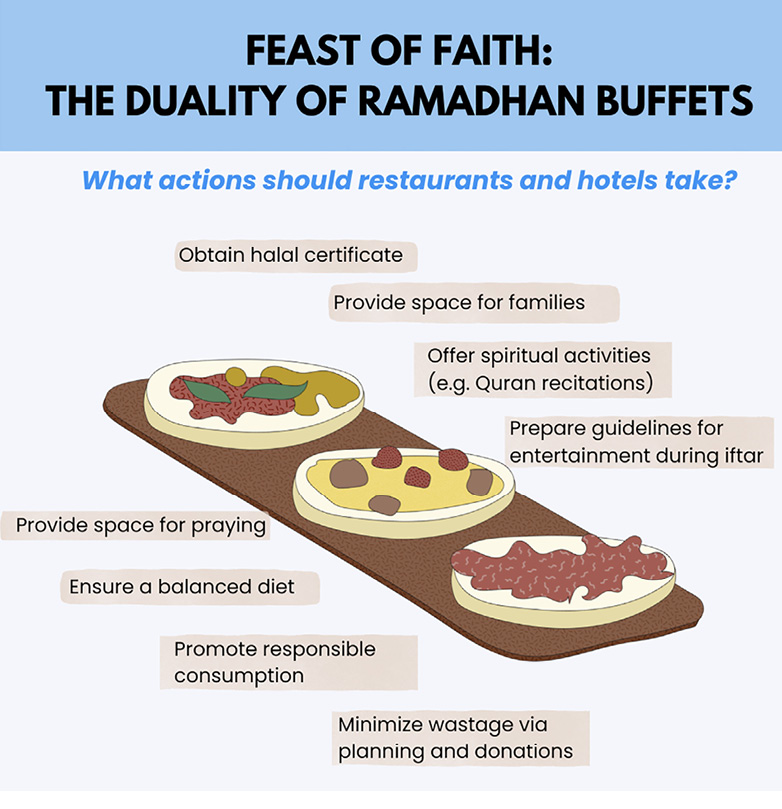
Ramadhan buffets in Malaysian hotels provide a convenient and luxurious dining option for fasting individuals and their families. Hotels compete to outdo one another each year with menu variety, culinary creativity, and lavish presentations.
These buffets support the local economy, particularly the hospitality and food industries. They create employment opportunities for chefs, cooks, servers, and other hospitality professionals while stimulating tourism.
Recognising the significance of Ramadhan buffets in promoting gastronomy tourism, the Ministry of Tourism, Arts, and Culture, in collaboration with key partners such as Tourism Malaysia, the Islamic Tourism Centre (ITC), the Malaysian Association of Hotels (MAH), and the Malaysian Association of Hotel Owners (MAHO), introduced the MY Ramadhan Experience packages in 2024.
This immersive programme not only provides a glimpse into the vibrant Ramadhan festivities but also offers guests the opportunity to indulge in complimentary iftar meals and experience the delights of Ramadhan buffets (Tourism Malaysia, 2024).
CRITICISM OF RAMADHAN BUFFETS
While immensely popular, Ramadhan buffets have not escaped criticism. One prominent concern, as articulated by the Perak Religious Council President, is their departure from the actual Islamic teachings. This departure manifests in several ways, including food waste and commercialising Ramadhan buffets (Leong, 2022).
One significant concern is the potential for food wastage, as hotels often prepare large quantities to cater to diverse tastes and preferences. This contradicts the Islamic principle of avoiding excess and contributes to environmental degradation and resource depletion.
Being wasteful is an act abhorred in Islam, as attested in verses 26 and 27 of Surah al-Isra’ in the Quran.
“Give to close relatives their due,
as well as the poor and ‘needy’ travellers.
And do not spend wastefully. Verily spendthrifts are brothers of Satan; and
Satan is to his Lord (himself) ungrateful.”
(Quran, Surah al-Isra, 17: 26 and 27)
Another criticism is the commercialisation of Ramadhan, with restaurants and hotels capitalising on the spiritual season to maximise profits. Some establishments charge exorbitant rates for their buffet offerings, reaching financially burdensome levels for many individuals and families.
This exploitation for profit-seeking purposes is viewed as antithetical to the principles of compassion, generosity, and social justice emphasised during the holy month.
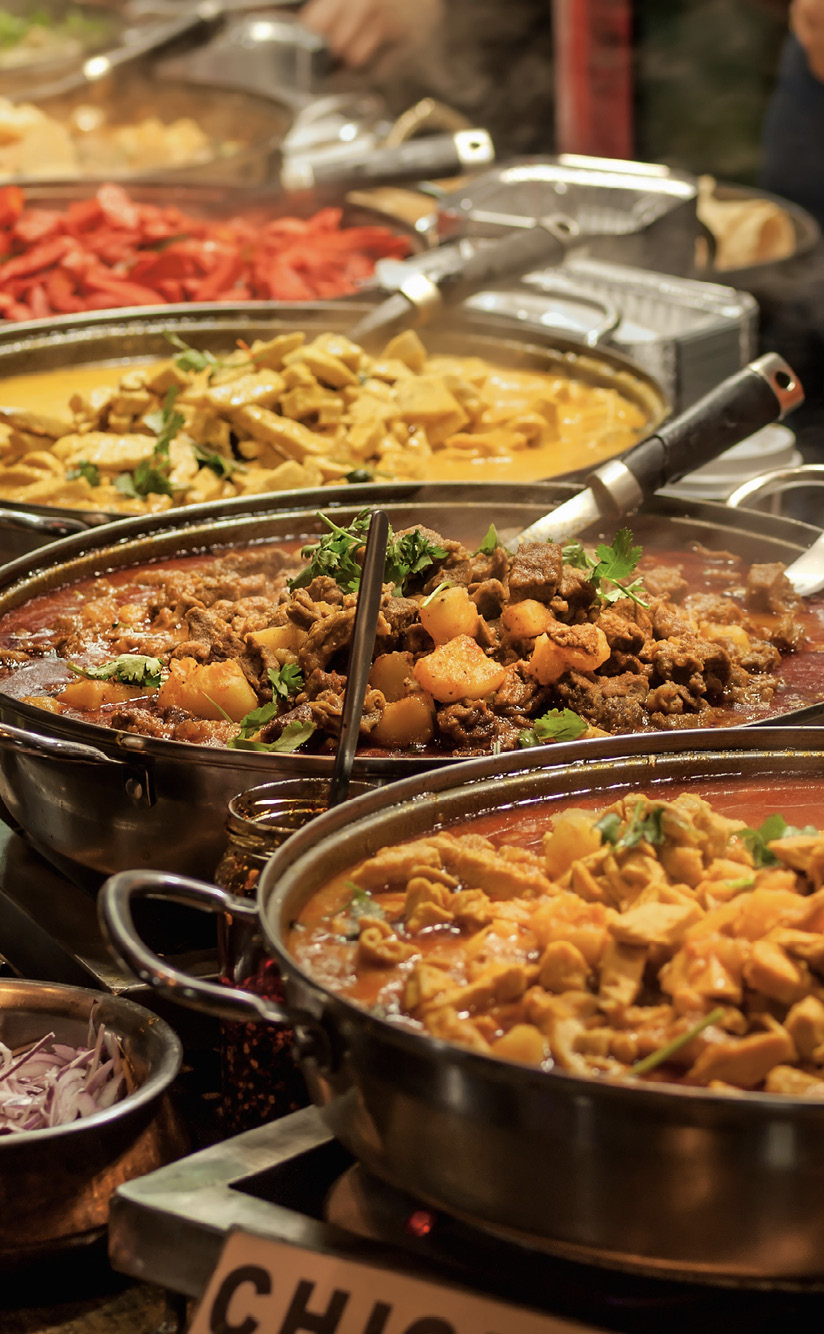
Additionally, the term “Ramadhan buffet” is often used indiscriminately to boost sales or profits without adhering to halal standards and quality or having halal certifications, which can be confusing for Muslims.
Additionally, entertainment distractions during Ramadhan buffets have also raised concerns. It is typical for hotels and restaurants to feature live music performances and singers during Ramadhan buffets to enhance the ambience and create a lively atmosphere.
However, this practice has been criticised for contradicting Ramadhan’s solemnity and spiritual focus. Instead of fostering an environment conducive to reflection and worship, these distractions may promote frivolity and indulgence, undermining the intended purpose of Ramadhan observance.
STRIKING A BALANCE
Ramadhan buffets can offer a meaningful and enriching experience when approached with mindfulness, even in light of these criticisms. These strategies include:
• Ensuring halal certification and standards: Restaurants and hotels must ensure their premises are certified halal to avoid confusion among Muslim consumers. By upholding halal standards, hotels can build trust with Muslim customers and uphold the values of honesty and integrity in business practices.
• Enforcing penalty for deception: Authorities should enforce stringent penalties to deter intentional deception of business owners targeting Muslims, including false claims of halal certification. Such measures are crucial to prevent recurrent misconduct and safeguard the sanctity of halal dietary practices.
• Promoting responsible consumption and minimising wastage: Efforts should also be made to minimise wastage through effective planning, portion control, and donation initiatives. Restaurants and hotels can take orders from visitors early to provide sufficient supplies. Additionally, they can partner with local communities and charitable organisations to distribute surplus meals to those in need, embodying the spirit of generosity and altruism that defines Ramadhan.
• Upholding the solemnity of Ramadhan: Restaurants and hotels should consider restricting live entertainment during iftar times and ensuring any performances are culturally and religiously appropriate. Alternative activities such as religious lectures and Quran recitations can enhance the spiritual atmosphere. Integrating congregational Tarawih prayers into the Ramadhan buffet experience can enhance the spiritual atmosphere and encourage guests to engage in acts of worship and reflection.
• Enhancing the dining experience for Families: Providing extra space for families to break their fast peacefully can significantly improve their dining experience.
• Ensuring a balanced diet: Offering a balanced diet with necessary nutrients is crucial for promoting overall well-being during Ramadhan. This ensures guests have the energy they need for fasting and worship.
MORE THAN JUST A CULINARY FEAST
Ramadhan buffets in Malaysian hotels offer a unique opportunity to celebrate the holy month’s blessings within a communal setting.
However, this celebration is accompanied by a dual perspective, encompassing both the opportunities and the criticisms.
By carefully addressing these dualities, restaurants and hotels can create an experience that not only honours the traditions of Ramadhan but also mitigates concerns surrounding issues such as food waste and commercialisation.
This approach transforms Ramadhan buffets into an integral part of the Malaysian hospitality experience, significantly contributing to the country’s tourism industry and promoting compassion and spiritual growth among guests while serving as a platform for cultural exchange, unity and understanding. – 



